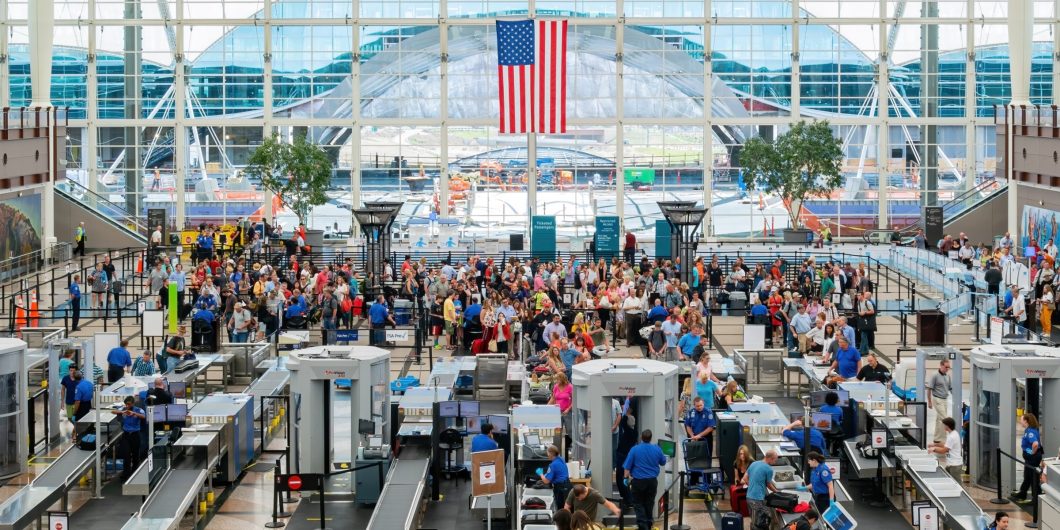Like the Roman Republic, the United States changed when the administrative state arose.
The Incapable States of America?
“In framing a government which is to be administered by men over men, the great difficulty lies in this: you must first enable the government to control the governed; and in the next place oblige it to control itself.”
James Madison, Federalist, No. 51
On May 1st—as SCOTUS sprung a leak—I was attempting to leave the United States, and not getting very far.
Pandemic notwithstanding, I’d spent the best part of a week reminded that US airports really aren’t good. Some of this is down to stupid rules: incoming international travellers with a connecting flight must clear immigration; collect their checked luggage; recheck the lot; then go through security, all over again.
Much of the problem, however, is down to incompetence.
When I arrived (at JFK), I encountered a badly managed zoo. There were only three gates open, which meant immense, snaking queues. TSA agents and officials in uniforms I could not place milled about on the other side. The air-conditioning failed. Ventilation was poor.
Masks—banished from airlines thanks to a court order—were still enforced in the terminal. My response to mandatory masking has tended towards meh whenever I’ve encountered it. When I opposed Britain’s coronapanic, I directed the bulk of my ire at lockdowns and absurdly large fines, and on civil liberties grounds. Masks were a sideshow, and like most non-Americans, I watched intense US masking debates with a degree of bemusement.
However, as northward of a thousand people sweated and stank, I could see why a significant number of Americans were exercised more than anything else by masking rules: drenched, poked under noses, worn as a chinstrap, hastily dragged upwards when an authority figure walked past. The whole sorry business was redolent of service in a Sicilian bank just before siesta, right down to the plethora of uniformed officials (some government, some private) with overlapping and contradictory responsibilities.
“Can you not open more gates?” (asked in a crisp German accent).
“That’s the TSA doing that” (from an official, his mask pulled aside to facilitate speech).
“I need a wee!” (a child, perhaps four or five, bouncing up and down, with a Northern accent).
As I watched the moment approach when I would miss my connecting flight, my property was somehow split between two conveyor belts. Suitcase one way, electronics the other. I am tall and tried to keep track of the latter by looking over people’s heads. The funk worsened. A man of similar height occluded my vision and my iPad Pro disappeared. I waited on the other side, hopping from foot-to-foot as I put my shoes back on.
Ten minutes. No iPad.
A great deal of property was piling up in front of one TSA agent; he was becoming flustered. “Are you all right?” (the German again). With that mixture of truculence and entitlement one sees in people who have been hired for a job they do not understand, he told the German to wait. “Do you need help?” (from the bouncing child’s mother, in an accent I now recognised to be Geordie).
The whites of the TSA agent’s eyes were showing, with lines of sweat on either side of his mask, where smile lines would be if you could see his mouth. Electronic equipment continued to accumulate in front of his scanner.
“I know how to work that machine. Let me help you.” That was me.
And that was how I finished up on the TSA side: providing instructions in scanner operation (a skill I learnt as part of a piece of long-ago litigation, but never expected to use again). I retrieved my iPad. The Geordie woman’s son ran to the loo as she collected her laptop and coiled its cable around her forearm. I ducked back under the tape.
The TSA agent grovelled to me in a way common among Americans but that I’ve always found disconcerting. “He probably wants a tip now” (the Geordie woman, looking thunderous); “no wonder the Yanks can’t win any wars,” she added, before taking her son’s hand and stalking off.
At the other end, I found a stretch limo waiting for me. Getting ferried about in a limo after The Trip from Hell is something I’ve experienced before, in Damascus, before the Syrian civil war. Classic third world. Like Syrians, American hosts send limousines to the airport to pick you up because they know you flew in from JFK and will need to be appeased.
State capacity allows one to draw distinctions at varying levels of granularity between developed countries, and is especially salient when it comes to healthcare, policing, and immigration.
My experience is illustrative of something not confined to airports, however. Indeed, if it were only confined to airports, then the phrase I’m about to use (about the US) would be unfair (to the US). America’s dysfunctional airports are instances of widespread low state capacity. And this is bigger than airports. Low state capacity can only be used to describe a country when it is true of multiple big-ticket items, not just one.
State capacity is a term drawn from economic history and development economics. It refers to a government’s ability to achieve policy goals in reference to specific aims, collect taxes, uphold law and order, and provide public goods. Its absence at the extremes is terrifying, and often used to illustrate things like “fragile states” or “failed states.” However, denoting calamitous governance in the developing world is not its only value. State capacity allows one to draw distinctions at varying levels of granularity between developed countries, and is especially salient when it comes to healthcare, policing, and immigration. It has a knock-on effect in the private sector, too, as business responds to government in administrative kind.
Think, for example, of Covid-19. The most reliable metric—if you wish to compare different countries’ responses to the pandemic—is excess deaths per 100,000 people over the relevant period. That is, count how many extra people died beyond the pre-pandemic mortality rate on a country-by-country basis. For the sake of argument, drop the five countries leading this grim pack. Four of them are developing countries, and the fifth is Russia, which while developed, is both an autocracy and suffers from chronic low state capacity.
At the other end of the scale, ignore China, too. It may be lying about its success or, more plausibly, may have achieved it by dint of being an authoritarian state with high state capacity (notably, the latest round of draconian lockdowns in Shanghai commenced after the WHO collated that data).
The US has the worst excess death rate in the developed world (140 per 100,000). Australia has the best: -28 per 100,000. Yes, you read that right. Australia increased its life expectancy and general population health during the pandemic. So did Japan, albeit less dramatically. The rest of the developed world falls in between those two extremes: Italy and Germany are on 133 and 116 per 100,000 respectively, with the UK (109 per 100,000) doing a bit better. France and Sweden knocked it out of the park (63 and 56 per 100,000 excess deaths).
Recall, too, that not only did different countries adopt different approaches to pandemic management; sometimes there were large differences within countries. Like the US, Australia is a federal system, and as in the US, different states did things differently. Melbourne, capital of the state of Victoria, had the longest lockdown of any major city in the developed world. Other Australian states, meanwhile, locked down sparingly or not at all. In a European context, Sweden rejected most over-the-top Covid responses, the UK was somewhere in the middle, and Italy was thoroughly draconian, even barring unvaccinated people from supermarkets and groceries.
Covid-19 revealed starkly which countries have well-run healthcare systems and which do not. The result is interesting because it doesn’t correlate with political ideology, type of economy, territorial scale, or size of population.
The only way to square this circle is to add the rider that while the most successful countries did different things, they did them competently. It also suggests, in epidemiological terms, there were more ways of killing the Covid cat than cutting its throat.
America’s unusually poor state capacity (given, like Australia and Western Europe, it is a wealthy country) has political, social, and military consequences.
I’ve long suspected that the widespread desire for a government small enough to drown in the bathtub reflects the negative experience many Americans have with utterly Byzantine state and private sector bureaucracies plus associated general uselessness. By contrast, even mild libertarianism founders in Australia; I’m almost certain the country’s high state capacity explains why. Australia has the most successful immigration system in the world, and it is centrally planned. Australia also combines an unusually complex electoral system with civic literacy and compulsory voting.
US progressives, meanwhile, struggle to sell the big state vision they’ve seen work in other countries because Americans (rightly) suspect the local result will be reams of idiotic paperwork, general disorganisation, lobbyist capture, and cities littered with homeless drug addicts. Obama’s “you didn’t build that” is false in the US. Americans succeed despite their government, not because of it. Were Obama Australia’s PM, by contrast, his quip would be true.
Americans are individually charming and pleasant people who deploy their wits to get around a state that doesn’t work.
Relatedly, while I’m happy for the US to arm Ukraine with all the military hardware it has going spare, I agree with people who do not want US boots on the ground—but for different reasons. I have serious concerns that America’s low state capacity would see things like the wrong aircraft shot down and the wrong ground troops targeted: after all, both Ukrainians and Russians have lots of old Warsaw Pact kit. That is, I suspect the Geordie woman I encountered at JFK has a point.
There’s another thing going on, too. I’m afraid Wokery resonates in the US because it often seems true. Not in its specific claims—Americans aren’t a bunch of racists or homophobes or transphobes. The likes of Ibram Kendi and Robin DiAngelo are notable for a signature inability to count, distinguish between dependent and independent variables, or draw causal inferences. But for many people, when things don’t work, it’s easy to argue problems are systemic. Achieving anything is like swimming upstream through molasses.
This characteristic makes the US’s fight against Wokery harder than it is in the UK and elsewhere, because when so much of both the public and private sector is incompetently run, it can look like “systemic oppression,” however misconceived.
While the entire country is administered about as well as the UK’s Home Office or Germany’s military (two bodies that, shall we say, have not enjoyed stellar reputations of late), it makes the US seem poorer than it is when one considers its GDP per capita. The effect in industries as disparate as banking and transport baffles visitors. It looks as though there’s too much focus on the second limb of Madison’s famous observation before the first has been achieved.
First, control the governed. Then, control the government. I mean, the airports are probably a lost cause. We’ll have to see about SCOTUS.



